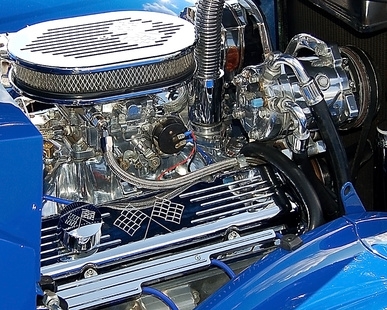
Chevrolet manufacturers two V-8 engine families; the small-block and big-block, both relating to engine size, or displacement. Small-block Chevrolet engines are lighter in weight, more economical, easy to modify and popular for use in classic car restoration. Burned valves are also a common problem, causing the engine to idle and run poorly. Most often with the Chevy small-block engine, the valves that are near the back of the engine -- close to the firewall -- burn due to lack of proper cooling. Even though the engine is water-cooled, in some cases air does not circulate effectively and heat becomes trapped. The valves overheat and burn, and do not "seat" properly.
Raise the hood of the car and notice how it idles. If a slight "popping" noise is heard, the problem is caused by a misfire. This can be caused by a burned valve, but also inspect the spark plug wires and make sure they are not burned or misrouted against hot exhaust pipes. If a loud hissing is heard and the engine misfires, this is probably caused by a vacuum leak. Inspect the small, black rubber hoses, and make sure they are intact and properly routed.
Operate the throttle linkage and see if the engine's misfiring is worsening, smoothing out, or staying the same. Burned valves don't get better with increased engine speed. Intermittent misfires, normally caused by ignition system problems, cause "shudders" as they come and go. A severely burned valve causes the engine to worsen as speed increases.
Inspect the tail pipe for heavy soot and carbon deposits. A burned exhaust valve, which is the most common valve failure, allows raw fuel to enter the exhaust stream, where it partially burns and deposits sooty residue on the pipes and in the catalytic converter. In some cases, the converter overheats and glows with all the extra fuel inside of it. If too much fuel enters the converter, it could explode.
Run a compression test to verify if the valves are intact or burned. Remove all of the spark plugs and install a compression tester in one spark-plug hole at a time, and then crank the engine. Read the gauge. A strong small-block Chevy engine will read around 125 pounds per square inch (psi) on each cylinder. If the cylinder has a burned valve, the pressure will be 25 to 45 psi, although it may be higher depending on the severity of the defective valve. Adding a few drops of oil to the cylinder will increase the compression reading if the piston rings are defective, but it will not improve the reading if the valve is burned.